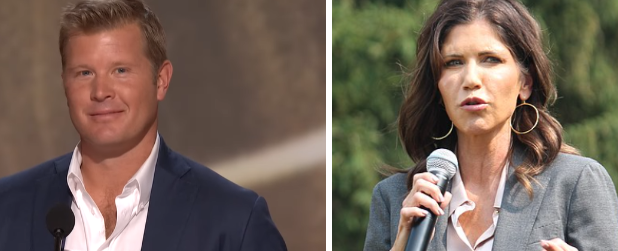
- Details
- By Levi Rickert
Native Vote 2024. Montana GOP senatorial candidate Tim Sheehy, who is already in hot water with Native Americans in Montana and nationally for his racist and disparaging comments about Crow Indians, is touring Montana this weekend with anti-Native American South Dakota Governor Kristi Noem (R-SD).
Conservative Montana Talks reports that the two will tour the state with three rallies on Sunday in Billings, Great Falls, and Kalispell.
The tour most likely will do anything to win Native votes for Sheehy who is running against incumbent U.S. Sen. Jon Tester (D-MT), who is seeking a third term.
Sheehy got in hot water with the Montana tribes after it was revealed that in a couple of recorded audio clips, he was caught making fun of Native Americans. Last November 6, 2023, he was recorded at a fundraiser bragging about roping and branding with members of the Crow Nation. He says “it’s a great way to bond with the Indians while they’re drunk at 8:00 a.m.”
The recordings caused the ire of Native Americans with a rebuke from the Crow Nation, several Native American groups in Montana and from the National Congress of Americans, the largest Native American national organization, based in Washington, D.C.
Montana tribal leaders have demanded Sheehy to apologize about his racist comments. Instead, ex-Navy Seal Sheehy has shown no courage when it comes to dealing with the tribes in Montana. He has completely ignored the tribal leaders’ demand and now is teaming up with Noem to help his election effort.
The teaming does little to help Sheehy win support from Native Americans in Montana. The South Dakota governor is banned from six of the nine federally recognized tribes in the state. In land mass combined, the reservations of the six tribes make up almost 20 percent of South Dakota.
Noem, who was mentioned a possible running mate to former President Donald Trump on the Republican ticket, is the same governor who in her autobiography revealed she had killed her personal dog,
In the book, Noem describes killing “Cricket,” a 14-month wirehaired pointer that Noem writes had an aggressive personality.
Noem deemed Cricket as untrainable to be a hunting dog because she went "out of her mind with excitement” during a pheasant hunting trip. Upon return from the trip, Noem says Cricket killed another family’s chickens. When Noem attempted to stop Cricket Noem was bitten by the dog.
One of the rallies will be held in Kalispell about 100 miles from the Blackfeet Indian Reservation. Tom Rodgers (Blackfeet), a Washington, D.C. strategist and Native American advocate, says perhaps Native Americans in the state should hide their “rez” dogs this weekend.
In 2022, Tester, who sits on the U.S. Senate Committee on Indian Affairs, helped to secure historic funding for Indian Health Service (IHS): an increase of $297 million over the previous year’s funding.
In Montana, there are eight federally recognized tribes and seven Indian reservations. And, there are 74,130 Native American of the voting age in the state, according to Four Directions Native Vote.
Sheehy is in a tight race against three-term U.S. Sen. Tester (D-MT), a member of the U.S. Senate Committee on Indian Affairs. In an article published on Friday, August 30, 2024, Sheehy leads the race by 3.5 percentage points in an average of 13 polls, according to The Hill.
More Stories Like This
Native News Weekly (August 25, 2024): D.C. BriefsUS Presidents in Their Own Words Concerning American Indians
Two West Virginia Guardsmen Shot Near White House
Next on Native Bidaské: Chef Sean Sherman Talks “Turtle Island” and the Future of Indigenous Food
Deer Camp: A Family Tradition That Runs Deep
Help us tell the stories that could save Native languages and food traditions
At a critical moment for Indian Country, Native News Online is embarking on our most ambitious reporting project yet: "Cultivating Culture," a three-year investigation into two forces shaping Native community survival—food sovereignty and language revitalization.
The devastating impact of COVID-19 accelerated the loss of Native elders and with them, irreplaceable cultural knowledge. Yet across tribal communities, innovative leaders are fighting back, reclaiming traditional food systems and breathing new life into Native languages. These aren't just cultural preservation efforts—they're powerful pathways to community health, healing, and resilience.
Our dedicated reporting team will spend three years documenting these stories through on-the-ground reporting in 18 tribal communities, producing over 200 in-depth stories, 18 podcast episodes, and multimedia content that amplifies Indigenous voices. We'll show policymakers, funders, and allies how cultural restoration directly impacts physical and mental wellness while celebrating successful models of sovereignty and self-determination.
This isn't corporate media parachuting into Indian Country for a quick story. This is sustained, relationship-based journalism by Native reporters who understand these communities. It's "Warrior Journalism"—fearless reporting that serves the 5.5 million readers who depend on us for news that mainstream media often ignores.
We need your help right now. While we've secured partial funding, we're still $450,000 short of our three-year budget. Our immediate goal is $25,000 this month to keep this critical work moving forward—funding reporter salaries, travel to remote communities, photography, and the deep reporting these stories deserve.
Every dollar directly supports Indigenous journalists telling Indigenous stories. Whether it's $5 or $50, your contribution ensures these vital narratives of resilience, innovation, and hope don't disappear into silence.
 The stakes couldn't be higher. Native languages are being lost at an alarming rate. Food insecurity plagues many tribal communities. But solutions are emerging, and these stories need to be told.
The stakes couldn't be higher. Native languages are being lost at an alarming rate. Food insecurity plagues many tribal communities. But solutions are emerging, and these stories need to be told.
Support independent Native journalism. Fund the stories that matter.
Levi Rickert (Potawatomi), Editor & Publisher

